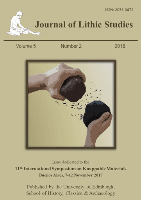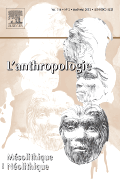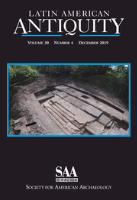
Journal of Lithic Studies
Scope & Guideline
Uncovering the past, one stone at a time.
Introduction
Aims and Scopes
- Lithic Technology and Production:
The journal emphasizes studies on the production techniques, typology, and technological analysis of lithic artifacts, exploring how these tools were made and used across different cultures and time periods. - Raw Material Sourcing and Distribution:
Research on the sourcing, procurement, and distribution of lithic raw materials is a core focus, examining how ancient peoples interacted with their environment to obtain the necessary resources for tool production. - Cultural and Social Implications of Lithics:
The journal seeks to understand the cultural significance of lithic tools, including their role in social structures, symbolic meanings, and interactions among different prehistoric communities. - Experimental Archaeology:
A unique contribution of the journal is its support for experimental archaeology, where hypotheses about lithic technology are tested through practical experimentation, providing insights into ancient behaviors and techniques. - Interdisciplinary Approaches:
The journal promotes interdisciplinary research that combines archaeology, geology, anthropology, and technology studies to provide a holistic understanding of lithic artifacts and their contexts.
Trending and Emerging
- Digital Archaeology and Data Sharing:
Recent papers highlight the increasing use of digital tools and platforms for archiving and analyzing lithic data, reflecting a broader trend towards digital archaeology that enhances accessibility and collaboration. - Interdisciplinary Methodologies:
There is a growing trend towards interdisciplinary approaches that incorporate methods from geology, anthropology, and computational sciences, allowing for more comprehensive analyses of lithic technology and behavior. - Focus on Technological Variability:
Emerging research emphasizes the variability in lithic technologies across different cultures and time periods, moving away from monolithic narratives and highlighting the complexity of human adaptation and innovation. - Experimental and Simulation Studies:
An increase in experimental archaeology and simulation studies is evident, as researchers seek to understand the practical implications of lithic technology through hands-on experimentation and data modeling. - Cultural Transmission and Interaction:
Themes related to the transmission of knowledge and technology, particularly in the context of social networks and intercultural interactions, are gaining prominence, reflecting an interest in understanding how lithic technologies spread and evolve.
Declining or Waning
- Traditional Typological Studies:
There has been a decline in purely typological studies of lithic artifacts without contextual analysis, as the field moves towards more integrative approaches that consider technological and social dimensions. - Overemphasis on Specific Geographic Regions:
Some geographic areas, such as the American Southwest, which previously received significant attention, are now less frequently covered, suggesting a shift towards more global or diverse archaeological contexts. - Static Models of Technological Change:
Research that relies heavily on static models of lithic technology evolution is waning, as scholars increasingly recognize the need for dynamic models that account for variability and adaptation in lithic production.
Similar Journals

ANTHROPOLOGIE
Pioneering Research in Anthropology and Science HistoryANTHROPOLOGIE, published by Elsevier France - Éditions Scientifiques Médicales Elsevier, is a leading academic journal dedicated to advancing the fields of Anthropology and the History and Philosophy of Science. With a publication history that dates back to 1947, this esteemed journal has steadily carved its niche within the scholarly community, achieving a commendable Q2 rank in both the aforementioned categories in 2023. Although it does not offer Open Access, ANTHROPOLOGIE provides robust access options through institutional subscriptions, ensuring that researchers and practitioners alike can delve into its rich repository of knowledge. The journal's impact is underscored by its competitive Scopus rankings, particularly its position within the 65th percentile for History and Philosophy of Science and 56th percentile within Anthropology. Through rigorous peer-reviewed articles that illuminate a wide array of anthropological inquiries and philosophical debates, ANTHROPOLOGIE continues to be an essential resource for those committed to exploring the complexities of human behavior, culture, and scientific understanding in an ever-evolving world.

LATIN AMERICAN ANTIQUITY
Exploring Pre-Columbian Cultures and Ancient CivilizationsLATIN AMERICAN ANTIQUITY is a prestigious journal published by Cambridge University Press, focusing on the archaeology and history of Latin America. With an impressive impact factor reflecting its critical role in the academic community, this journal exemplifies excellence in research, landing in Q1 across multiple categories, including Archaeology and History, as per the 2023 category quartiles. The journal's scope covers a broad range of topics related to pre-Columbian cultures, ancient civilizations, and historical developments, making it essential reading for researchers, professionals, and students keen on exploring the rich tapestry of Latin American heritage. Although it is not an open-access publication, LATIN AMERICAN ANTIQUITY remains a vital resource for those dedicated to advancing knowledge in this dynamic field. With its commitment to scholarly rigor and a strong ranking in Scopus, it serves as a cornerstone for academic dialogue and investigation.

Relaciones
Fostering Insight, Shaping Futures.Relaciones is a prestigious open-access journal published by the SOC ARGENTINA ANTROPOLOGIA, dedicated to the field of anthropology. Since its inception in 1937, this journal has served as a vital platform for disseminating innovative research and insights within the social sciences community. With both its print (ISSN: 0325-2221) and online (E-ISSN: 1852-1479) formats, Relaciones ensures widespread accessibility, empowering researchers, professionals, and students to engage with contemporary anthropological discourse. The journal aims to foster critical discussions that not only reflect on cultural and societal issues but also contribute to theoretical advancements in anthropological methodologies. By maintaining a commitment to quality and open access, Relaciones plays a crucial role in shaping the future of anthropology in Argentina and beyond, encouraging scholarly collaboration and enriching the academic landscape.

Bulgarsko e-Spisanie za Arkheologiya-Bulgarian e-Journal of Archaeology
Connecting scholars to the past, present, and future of archaeology.Bulgarsko e-Spisanie za Arkheologiya - Bulgarian e-Journal of Archaeology is a prominent open-access journal published by the ASSOC BULGARIAN ARCHAEOLOGISTS since 2011, serving as a vital platform for the dissemination of archaeological research and findings in Bulgaria and beyond. With the ISSN 1314-5088, this journal is dedicated to advancing knowledge in the field of archaeology, facilitating the sharing of innovative studies, fieldwork results, and theoretical discussions. It is particularly significant for researchers, professionals, and students who are interested in the archaeological heritage of Bulgaria, providing an accessible venue for high-quality scholarly contributions. The journal's commitment to open access ensures that its rich repository of knowledge is available to a global audience, enhancing collaboration and fostering new discoveries within the discipline.

Archaeological and Anthropological Sciences
Unveiling the Past, Shaping the FutureArchaeological and Anthropological Sciences is an esteemed peer-reviewed journal published by Springer Heidelberg, specializing in the interdisciplinary fields of archaeology and anthropology. Since its inception in 2009, this journal has established itself as a pivotal resource for researchers and professionals, featuring cutting-edge studies that bridge the gap between the sciences and humanities. With its impressive 2023 Q1 rankings in Anthropology and Archaeology categories, the journal stands out in the Scopus landscape, ranking within the top 5% of its field—Rank #18/413 in Archaeology (Arts and Humanities) and Rank #28/502 in Anthropology. This is complemented by its commitment to disseminating high-quality research to a global audience, despite being a non-Open Access publication. The journal's scope encompasses innovative methodologies, archaeological findings, and anthropological insights that are vital for advancing knowledge and fostering academic discourse. As it moves toward its upcoming converged years, Archaeological and Anthropological Sciences continues to solidify its reputation as a key forum for scholarly exchange in these fields.

Bulletin de la Societe Prehistorique Francaise
Connecting Past and Present: Insights from Prehistoric StudiesBulletin de la Societe Prehistorique Francaise (ISSN: 0249-7638; E-ISSN: 1760-7361), published by the SOCIETE PREHISTORIQUE FRANCAISE, stands as a pivotal journal within the domain of archaeology, particularly emphasizing prehistoric studies. With its classification in the Q2 quartile of both the arts and humanities as well as social sciences in archaeology, the journal positions itself among the top 25% of publications in these categories as of 2023. This distinguished ranking reflects its significant contribution to the field, providing researchers, professionals, and students with critical insights and innovative methodologies related to prehistoric research. Although open access options are currently unavailable, the journal is committed to fostering academic discourse and sharing knowledge that influences contemporary archaeological practices. As a member of the elite academic community, Bulletin de la Societe Prehistorique Francaise is highly regarded for its rigorous peer-review process and dedication to the advancement of archaeology, making it an essential resource for anyone invested in understanding our historical roots.

SOUTH AFRICAN ARCHAEOLOGICAL BULLETIN
Unearthing South Africa's Rich Heritage.Welcome to the SOUTH AFRICAN ARCHAEOLOGICAL BULLETIN, a premier academic journal dedicated to the dynamic field of archaeology in South Africa and beyond. Published by the SOUTH AFRICAN ARCHAEOLOGICAL SOC, this journal boasts an impressive Q1 ranking in both Archaeology (arts and humanities) and Archaeology categories as of 2023, placing it among the top tier of scientific journals in its discipline. With an extensive publication history spanning from 2002 to 2023, it serves as a crucial platform for disseminating pioneering research and scholarly discussions that illuminate the rich tapestry of South African archaeological heritage. Although it does not currently offer open access, the journal’s rigorous peer-review process, combined with its standing in the Scopus rankings—where it ranks 78 out of 413 in the arts and humanities and 75 out of 354 in social sciences—underscores its commitment to academic excellence. Researchers, professionals, and students alike will find this journal an essential resource for exploring innovative methodologies, archaeological discoveries, and theoretical advancements shaping the understanding of human history.

Intersecciones en Antropologia
Fostering collaboration in the heart of anthropology.Intersecciones en Antropologia, published by the Universidad Nacional del Centro de la Provincia de Buenos Aires (UNICEN), Facultad de Ciencias Sociales, is a premier open-access journal in the field of anthropology, having established its presence since 2010. With an impressive impact factor and currently holding the distinguished Q1 quartile ranking in anthropology for 2023, this journal has quickly become a vital resource for scholars and practitioners alike, offering a platform for innovative research and critical discussion. The journal aims to advance anthropological scholarship by encouraging the dissemination of diverse perspectives and stimulating dialogue across geographical and cultural boundaries. Its open-access model, adopted in 2017, ensures that valuable research findings are accessible to a global audience, fostering collaboration and engagement within the academic community and beyond. Located in the vibrant cultural context of Argentina, Intersecciones en Antropologia serves as a conduit for significant anthropological dialogues, making it an essential read for those dedicated to understanding and contributing to the evolving landscape of social sciences.

Anadolu Arastirmalari-Anatolian Research
Innovating Insights into Archaeology and HistoryAnadolu Arastirmalari-Anatolian Research, published by ISTANBUL UNIVERSITY, is a prominent open-access journal dedicated to the exploration of history, archaeology, and related fields. Since its transition to open access in 2017, the journal has become a vital resource for scholars and practitioners, facilitating the dissemination of innovative research findings. With a strong focus on the intricacies of Anatolian history and archaeology, the journal has earned notable recognition, achieving a Q1 ranking in History and Q2 rankings in both Archaeology and Arts and Humanities categories as of 2023. This positions it among the foremost journals in its field, providing an essential platform for interdisciplinary research and discourse. The journal's impact factor is evidenced by its significant citation metrics and rigorous editorial standards, aiming to contribute meaningfully to scholarly dialogue and knowledge production. Researchers, professionals, and students alike will find this journal indispensable for understanding the rich tapestry of Anatolian culture and heritage.

Studijne Zvesti Archeologickeho Ustavu Slovenskej Akademie Vied
Advancing archaeological knowledge, one study at a time.Studijne Zvesti Archeologickeho Ustavu Slovenskej Akademie Vied is a leading journal in the field of archaeology, published by the SLOVENSKA AKAD VIED, ARCHEOLOGICKY USTAV, based in Nitra, Slovakia. This esteemed journal, with the ISSN 0560-2793, has established itself as a vital resource for scholars and researchers, reflecting significant academic contributions in both the arts and humanities as well as social sciences. With a 2023 Scopus ranking placing it in the second quartile (Q2) for archaeology, it showcases rigorous research and innovative methodologies, essential for advancing archaeological studies. While it is not an Open Access journal, it continues to offer valuable insights into archaeological findings, theoretical frameworks, and interdisciplinary approaches. The journal serves as a bridge, connecting local Slovak archaeology with international discourse, making it an indispensable tool for students, professionals, and academics striving for a deeper understanding of the archaeological heritage of Slovakia and beyond.